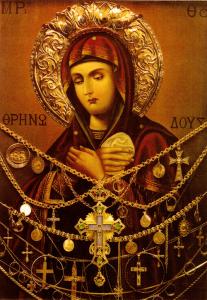
As I noted the other day, I’ve been trying to be more attentive in my prayer, not merely in the sense of more aware of which prayers I do say but more importantly in intentionally reflecting on the words of those prayers—the individual units that make up whatever I am asking of God. What has become clearer for me is that petitionary prayer is never just a question of requests—worse yet, demands—but instead a rich mode of contemplation. The words of our traditional ways of addressing God help us to see what God desires of us—what His will is—as much as anything else. In truth, they help to teach us what He is, and therefore what He wants of us.
This is true of the “Hail Mary,” even if the prayer itself is, by necessity, intercessory, that is, a way of asking a saint to pray for us to God, of giving due veneration to a holy person, connecting us with the dead in Heaven, whom we hope to join one day.
This particular prayer is essentially composed of two different quotations from Scripture:
And coming to her, he said, “Hail, favored one! The Lord is with you. (Luke 1:28)
Most blessed are you among women, and blessed is the fruit of your womb. (Luke 1:42)
The third part was attached to the rest a bit later:
The petition “Holy Mary, Mother of God, pray for us sinners now and at the hour of our death. Amen.” is stated by the official “Catechism of the Council of Trent” to have been framed by the Church itself. “Most rightly”, says the Catechism, “has the Holy Church of God added to this thanksgiving, petition also and the invocation of the most holy Mother of God, thereby implying that we should piously and suppliantly have recourse to her in order that by her intercession she may reconcile God with us sinners and obtain for us the blessing we need both for this present life and for the life which has no end.”
The prayer is thus partly-Scriptural, especially the part venerating Mary herself, and partly a later manifestation of pious intercession. In this history, it becomes clearer that what might at first seem merely petitionary is not only that, or not even primarily (even historically) that.
Though I imagine most readers know it, here is the full text as I pray it, so that my meditation might be easier to follow:
Hail Mary,
Full of Grace,
The Lord is with thee.
Blessed art thou among women,
and blessed is the fruit
of thy womb, Jesus.
Holy Mary,
Mother of God,
pray for us sinners now,
and at the hour of death.Amen.
Let’s get to it then. The first three lines call our attention to Mary, the Blessed Mother and Theotokos, telling us two things: first that she is “full of grace” and second that “the Lord is with her.” But why is she full of grace and how, exactly is the Lord with her in a way that He is not with us all? The answer that first presents itself is the reality of the Incarnation, the truth of God’s becoming man. But upon reflecting on these words we may also recall Mary’s “yes,” the fact that she accepted the will of the Lord without qualm:
But Mary said to the angel, “How can this be, since I have no relations with a man?” And the angel said to her in reply, “The holy Spirit will come upon you, and the power of the Most High will overshadow you. Therefore the child to be born will be called holy, the Son of God. And behold, Elizabeth, your relative, has also conceived a son in her old age, and this is the sixth month for her who was called barren; for nothing will be impossible for God.” Mary said, “Behold, I am the handmaid of the Lord. May it be done to me according to your word.” Then the angel departed from her. (Luke 1:34-38)
“Ecce ancilla Domini. Fiat mihi secundum verbum tuum.” “Behold, [I am] the handmaid of the Lord. May it be done to me according to your word.” What we see here, to my mind, is not merely a call to love Mary, to honor her—though that is important—but also a call to recognize her humility, her willingness to be the Lord’s “handmaid,” His “servant,” the one who said “yes” to the impossible. She asks “how,” incredulous. Gabriel explains and she accepts the will of God, even when it seems totally incomprehensible.













